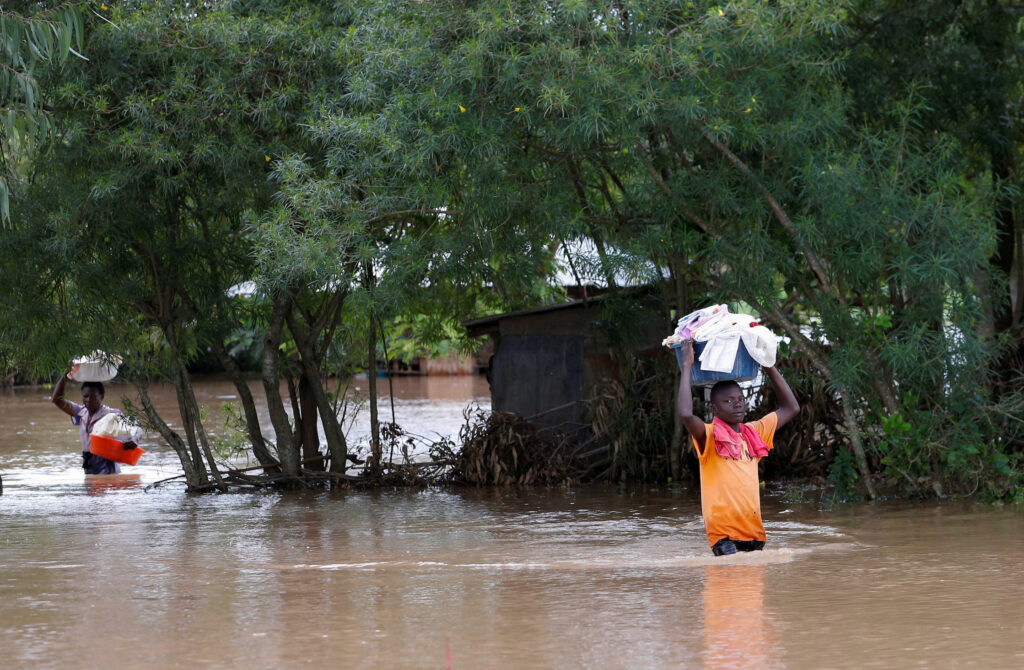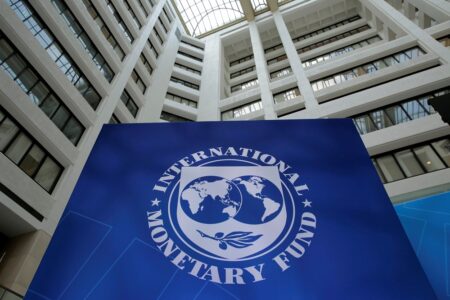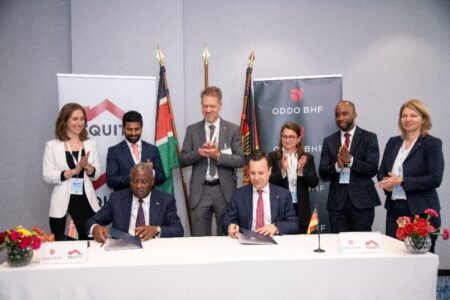- In Africa, climate resilience is limited due to socio-economic vulnerabilities and limited adaptive capacity.
- The UNEP report calls for an accelerated increase in adaptation efforts and finance to address the mounting risks, particularly in developing nations.
- In 2022, adaptation finance for developing countries rose to $28 billion, a far cry from the $187-$359 billion per year required to bridge the gap by 2030.
As the global climate crisis intensifies, the impacts are hitting vulnerable regions hardest, with Africa bearing the brunt of devastating consequences.
According to the United Nations Environment Programme (UNEP) Adaptation Gap Report 2024, average global temperatures will rise by 2.6-3.1°C above pre-industrial levels by the century’s end, far exceeding the 1.5°C threshold agreed upon in the Paris Agreement.
This rise in temperature translates to increased frequency and severity of extreme weather events such as droughts, floods, and heat waves. These impacts are currently felt acutely in Africa, where climate resilience is limited due to socio-economic vulnerabilities and limited adaptive capacity.
“Climate catastrophe is hammering health, widening inequalities, harming sustainable development, and rocking the foundations of peace,” UN Secretary-General António Guterres noted in a video message. “The vulnerable are hardest hit. And taxpayers are footing the bill. While the purveyors of all this destruction – particularly the fossil fuel industry – reap massive profits and subsidies.”
“Climate change is already devastating communities across the world, particularly the most poor and vulnerable. Raging storms are flattening homes, wildfires are wiping out forests, and land degradation and drought are degrading landscapes,” said Inger Andersen, Executive Director of UNEP.
She added, “People, their livelihoods and the nature upon which they depend are in real danger from the consequences of climate change. Without action, this is a preview of what our future holds and why there simply is no excuse for the world not to get serious about adaptation, now.”
The UNEP report calls for an accelerated increase in adaptation efforts and finance to address the mounting risks, particularly in developing nations. It underscores that adaptation is not merely a matter of survival; it is essential for ensuring sustainable development, reducing inequality, and maintaining peace.
For Africa, adaptation is vital for mitigating immediate climate impacts and ensuring long-term resilience and sustainable growth in agriculture, health, and infrastructure.
The adaptation finance gap: A crisis within a crisis
One of the critical issues UNEP highlights is the massive gap between the current flow of adaptation finance and the actual needs of vulnerable nations.
Statistics show that international public adaptation finance for developing countries rose to $28 billion in 2022, yet this is far from the estimated $187-$359 billion per year required to bridge the gap by 2030. This disparity is more pronounced in Africa, where limited resources and rising debt make adaptation financing particularly challenging.
The implications of this financing gap are severe. African countries face the dual challenge of climate impacts and escalating debt, which limits their capacity to invest in adaptation measures.
The UNEP report highlights that addressing the adaptation finance gap is a matter of global solidarity and shared responsibility, given that Africa contributes minimally to global emissions but suffers disproportionately from climate impacts.
Read also: Climate change crisis calls for women agro-empowerment
Strategic adaptation: Moving from reactive to transformational approaches
In recent years, African nations have made strides in developing National Adaptation Plans (NAPs), yet financial constraints and limited institutional capacity often hinder these efforts.
The UNEP report reveals that approximately half of the adaptation projects funded by international financing bodies are unsustainable without continued external support, underscoring the need for a shift in approach.
For Africa to build long-term resilience, adaptation efforts must go beyond reactive, short-term responses and embrace anticipatory, strategic, and transformational approaches.
This means investing in comprehensive adaptation strategies embedded within broader development agendas, such as climate-resilient agriculture, water resource management, and sustainable urban planning. Countries should also prioritize cross-sectoral integration and community engagement to ensure that adaptation actions are sustainable and context-specific.
Read also: Can Africa’s fragmented voice find unity at COP29 climate finance talks?
Innovative financing mechanisms to close the gap
The UNEP report amplifies the need for innovative financing models to bridge the adaptation finance gap, particularly for private sector engagement.
One promising approach is to create mechanisms that de-risk private investments using public finance, which could attract more funding from private entities for adaptation projects. This approach can be particularly effective in Africa, as public funds alone are insufficient to meet the region’s vast adaptation needs.
International financial institutions and multilateral development banks can play a crucial role by designing new funding facilities, establishing climate fiscal planning, and creating adaptation investment frameworks.
These institutions must also support reforms that make finance accessible and transparent, enabling African countries to secure resources for sustainable adaptation projects. Strengthening enabling conditions for the private sector, such as tax incentives and regulatory reforms, could further attract private capital into African climate adaptation.
The role of capacity building and technology transfer in Africa’s adaptation journey
Beyond finance, UNEP’s report points to the importance of capacity building and technology transfer for effective adaptation. African countries require robust institutional frameworks and skilled personnel to effectively implement and manage adaptation projects.
Additionally, technological solutions must be accessible, affordable, and tailored to meet local needs. For instance, technologies that support climate-resilient agriculture, early warning systems for natural disasters, and water conservation are crucial in African contexts.
However, technology transfer faces barriers such as high upfront costs, legal constraints, and a lack of supportive policies. The UNEP report advocates for capacity-building programs that prioritize marginalized and underrepresented communities and ensure equitable access to adaptation technologies.
Developing a holistic understanding of local needs rather than imposing top-down solutions will ensure that technology supports genuine resilience and sustainable development.
Building a climate-resilient Africa: Shared responsibility and global support
The UNEP report highlights a fundamental question: Who should bear the cost of adaptation? This question is particularly critical in Africa, given the continent’s limited contribution to greenhouse gas emissions and its heightened vulnerability to climate impacts.
The “common but differentiated responsibilities” principle must guide global efforts to support African nations in their adaptation journey. This involves financial support and ensuring that adaptation projects align with the needs and realities of African communities.
Countries historically contributing the most to climate change, such as those with significant fossil fuel industries, have an ethical obligation to support vulnerable nations in their adaptation efforts. The international community must commit to concrete actions at forums such as the COP29 to bolster adaptation finance, facilitate technology transfer, and build capacity for climate resilience in Africa.
From commitments to action on the climate crisis
UNEP’s Adaptation Gap Report 2024 findings underscore an urgent call to action for Africa and the world. Without substantial increases in adaptation finance and robust strategies, Africa will continue to face severe climate impacts that threaten its socio-economic stability and sustainable development goals.
This decisive decade requires the world to transition from pledges to meaningful action by closing the adaptation finance gap, fostering public-private partnerships, and prioritizing capacity building and technology transfer tailored to African needs.
Adapting to the climate crisis is a survival strategy for Africa. As COP29 approaches, the global community must commit to tangible solutions that ensure a resilient and climate-adapted Africa.
Through collective responsibility, innovative financing, and strategic adaptation planning, Africa can forge a sustainable future that safeguards its people, economy, and ecosystems from the devastating impacts of climate change.











